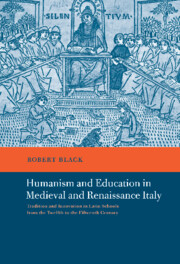 Humanism and Education in Medieval and Renaissance Italy
Humanism and Education in Medieval and Renaissance Italy Book contents
- Frontmatter
- Contents
- Acknowledgements
- List of abbreviations
- Editorial note regarding citations from manuscripts and publications
- A note on chronological terminology
- Introduction
- 1 Italian Renaissance education: an historiographical perspective
- 2 The elementary school curriculum in medieval and Renaissance Italy: traditional methods and developing texts
- 3 The secondary grammar curriculum
- 4 Latin authors in medieval and Renaissance Italian schools: the story of a canon
- 5 Reading Latin authors in medieval and Renaissance Italian schools
- 6 Rhetoric and style in the school grammar syllabus
- Conclusion
- Appendix I BL Harley 2653: the earliest known manuscript of Ianua
- APPENDIX II A handlist of manuscripts of Ianua
- Appendix III Manuscripts of Tebaldo's Regule
- Appendix IV Handlist of manuscripts of school authors produced in Italy and now found in Florentine libraries
- Appendix V Theoretical grammar manuscripts in Florentine libraries examined and included or eliminated as italian school grammars
- Appendix VI Authorities Cited Explicitly in Manuscripts of Major School Authors in Florentine Libraries
- Bibliography
- Index of manuscripts
- General index
1 - Italian Renaissance education: an historiographical perspective
Published online by Cambridge University Press: 25 July 2009
- Frontmatter
- Contents
- Acknowledgements
- List of abbreviations
- Editorial note regarding citations from manuscripts and publications
- A note on chronological terminology
- Introduction
- 1 Italian Renaissance education: an historiographical perspective
- 2 The elementary school curriculum in medieval and Renaissance Italy: traditional methods and developing texts
- 3 The secondary grammar curriculum
- 4 Latin authors in medieval and Renaissance Italian schools: the story of a canon
- 5 Reading Latin authors in medieval and Renaissance Italian schools
- 6 Rhetoric and style in the school grammar syllabus
- Conclusion
- Appendix I BL Harley 2653: the earliest known manuscript of Ianua
- APPENDIX II A handlist of manuscripts of Ianua
- Appendix III Manuscripts of Tebaldo's Regule
- Appendix IV Handlist of manuscripts of school authors produced in Italy and now found in Florentine libraries
- Appendix V Theoretical grammar manuscripts in Florentine libraries examined and included or eliminated as italian school grammars
- Appendix VI Authorities Cited Explicitly in Manuscripts of Major School Authors in Florentine Libraries
- Bibliography
- Index of manuscripts
- General index
Summary
The history of education is particularly susceptible to influence from wider intellectual, philosophical and political movements; scholars have been tempted to justify their own intellectual formation by applauding or condemning the educational attitudes and assumptions of previous epochs. Historians have normally been university teachers and involvement in present-day educational issues has encouraged a tendency to see their own situation and ideals in past structures of learning. Justifications and critiques derived from contemporary educational preoccupations have frequently been imposed onto the remote past. It is necessary to begin this study of Italian pre-university education with these truisms in mind, because so much of what has been written about medieval and Renaissance education has been affected by contemporary agendas. An effort, however imperfect, must be made to identify modern preoccupations. This is particularly important because current polemics have often had positive effects, leading to new insights into the past, but these genuine perceptions must be distinguished from the mass of anachronistic distortion. Historical fashions have often had beneficial results: automatic scepticism in the face of innovation can be mistaken for trenchant criticism; here too one must weigh up fashion's advantages and limitations.
A case in point comes from the great age of Italian positivism, which at the turn of the twentieth century encouraged widespread research in local archives and led to the publication of numerous fundamental documentary studies, including Bellemo on Chioggia; Cecchetti, Bertanza and Della Santa and Segarizzi on Venice; Barsanti on Lucca; Debenedetti on Florence; Gabotto on Piedmont; Massa on Genoa; Zanelli on Pistoia and Battistini on Volterra.
- Type
- Chapter
- Information
- Humanism and Education in Medieval and Renaissance ItalyTradition and Innovation in Latin Schools from the Twelfth to the Fifteenth Century, pp. 12 - 33Publisher: Cambridge University PressPrint publication year: 2001
